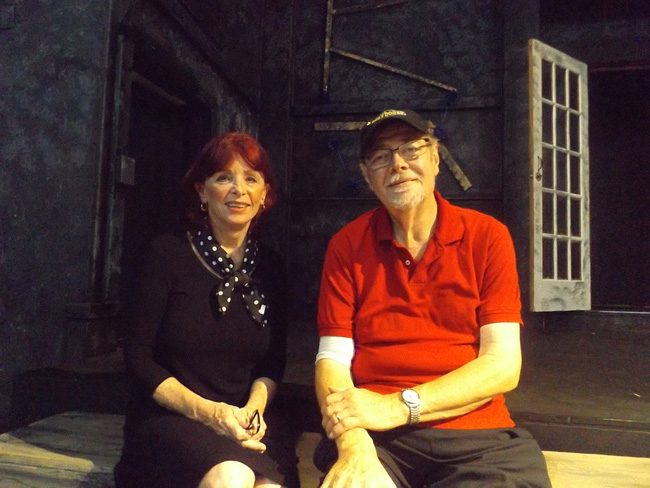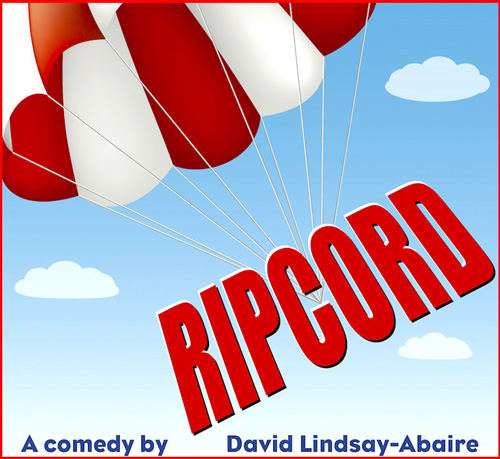
Following auditions last year at the Flagler Playhouse for “Sweeney Todd: The Demon Barber of Fleet Street,” playhouse president Monica Clark noticed that artistic director Larry Williams “was literally moved — I mean emotionally,” she says.
“I asked if he was OK and he said, ‘I’ve never seen this much talent come out for an audition in 30 years,’ ” Clark recalls. “He said everybody who was in the chorus could play a lead.”
“It was amazing,” Williams says of the Flagler Playhouse production of the 1979 Stephen Sondheim musical. “The chorus was as strong as it was deep.”
Williams moved to Palm Coast in 2015 with his wife, Terri, after a stint as a high school choral director followed by 25 years as the artistic director at the Municipal Opera Company of Allentown in Pennsylvania. (His wife served as president and choreographer of the opera troupe.)
“We’ve got a wealth of talent here – Flagler County alone and then you have people from Volusia who trickle in,” Williams says.
With season tickets for the upcoming year now on sale, the playhouse will need to harness that talent once again if it hopes to match last year’s banner – and daring — season, which included not only the gore fest of that throat-slashing barber but also a rarity among area community theater offerings: a dark dance with inner demons in the form of Tennessee Williams’ “memory play,” “The Glass Menagerie.”
Founded in 1978, the Flagler Playhouse had one of its best ever seasons last year, “artistically and financially, too,” Clark says as she and Williams sit in the converted former First Baptist Church building in Bunnell that has been the theater’s home since 2005.
Facing the proverbial tough act to follow, the 2019-20 season opens Sept. 20 with “Mamma Mia!,” that 1999 “jukebox” musical based on the hit songs of the pop group ABBA, and which became the ninth longest-running show in Broadway history. The season also includes the 1939 comedy “Arsenic and Old Lace,” the 1950 Tony Award-winning musical “Guys and Dolls,” the 2015 comedy “Ripcord,” and the musical revue “The Sensational 60s,” crafted by Williams and featuring hits of the 1960s by the Beatles and others.
Williams himself is facing a far greater personal challenge: He has been battling lung cancer since 2013, and now it’s at stage IV.
“I’ve been lucky — I have a lot of problems,” he says with a robust voice punctuated by a sardonic laugh, all of which belie the assaults on his body. “I’m also diabetic. I have a pacemaker.”
 “I’ve dealt with a lot of people who have been very sick, and I loved a lot of those people, and this man has the best attitude of anyone I’ve ever known,” Clark says. “If attitude has anything to do with longevity, he’s going to be around for a long, long time.”
“I’ve dealt with a lot of people who have been very sick, and I loved a lot of those people, and this man has the best attitude of anyone I’ve ever known,” Clark says. “If attitude has anything to do with longevity, he’s going to be around for a long, long time.”
“I hope so,” Williams says with laughter now more gentle than sardonic. “This (Flagler Playhouse) is my support group. Terri, my wife, will tell you I’m best when I’m working on a show. If I’m around people and things are positive and everybody is getting along and we’re having a good time and you’re molding something, watching it grow, like we do here, that’s the greatest satisfaction.”
This season, the three musicals will be directed by Williams — “God willing and the creek don’t rise,” he says.
The upcoming season’s lone bold offering is “Ripcord,” a 2015 work by David Lindsay-Abaire, who won the 2007 Pulitzer Prize for Drama for “Rabbit Hole” with its portrayal of the profound grief engendered by the accidental killing of a small child. The daring of “Ripcord” stems not from its subject matter – a comedy about two elderly widows duking it out a la “The Odd Couple” at a retirement home – but from the play’s lack of name recognition, which always summons the specter of dicey box-office revenues in the realm of community theater.
“Last year our shows were so good,” says Clark, who, during her past 14 years at the playhouse, has performed onstage and worked at just about every backstage task – lights, sound, set design, stage management. She begins her second two-year term as president on July 1.
That season’s success “certainly was not just because of business decisions – it’s production decisions,” Clark says. “We try to do plays that first of all people want to be in so we get the best cast, and secondly that people want to see.
“We took a couple of chances last year and went out on a limb and did ‘Sweeney Todd,’ which we had put off for years because it’s so difficult to do, and not only for the set which was very complicated.”
One payoff came with the 11 performers who auditioned for the very first time at the playhouse, and landed roles in the play.
“ ‘Sweeney Todd’ is one of those bucket-list shows that, if you’re a musical theater person, you want to be in it,” Clark says.
Williams recalls the scene: “A large number of new people came in and I’d go ‘Where the hell do you live?’ ‘Flagler Beach.’ ‘For how long?’ ‘Oh, I’ve been here since 2007.’ ‘Where the hell have you been?’ Those types of things. We have talent here — we really have talent here.”
As for last season’s other dare, the Tennessee Williams play, Clark says: “I’ve been here 14 years and that was the first year that we did a drama. The closest we had come was ‘Steel Magnolias,’ which is a dramedy (comedy-drama). ‘The Glass Menagerie’ was a major experiment because it is so dark — it is so dark. It was like ‘Hold your breath and see what the audience says.’ I’m always back there after every show when people are leaving, and they loved it. So, I was really, really happy.”
However, community theaters still must tread lightly into the dark side of the repertoire.
“We did audience evaluations and asked ‘What do you want to see?’,” Clark says.
The answer came back unequivocal, she adds: “Musicals and comedies, musicals and comedies. So, this year we have musicals and comedies. We might do another drama next year. I’d like to insert at least one because we should be challenging ourselves. It’s a matter of what can we do that will bring the talent and bring the patrons in, but still challenge us as a theater.”
Meanwhile, the Flagler Playhouse, a non-profit 501(C)3 organization, is sailing onward despite the ever-shifting winds of state grant support, which suddenly seem to be blowing in its favor.
Two years ago, the playhouse applied for a $25,000 Culture Builds Florida grant from the Florida Department of State’s Division of Cultural Affairs, just like the theater has “asked for it every year,” Williams says. The troupe received $20,000. Last year the theater received nothing after again requesting the same amount.
Not getting that grant was “a big hit,” Clark says.
“They cut not only us but everybody in the arts,” Williams says. Indeed, statistics from the Division of Cultural Affairs show that statewide funding for its four categories of cultural grants went from approximately $25 million in 2017-18 to $2.65 million in 2018-19 – a cut of almost 90 percent.
According to the Department of State website, Flagler Playhouse is one of 132 organizations and a handful of individual artists whose grant applications for 2019-2020 have been approved – all at 100 percent, and each for $25,000 or less.
The playhouse’s request for $25,000 for “underserved cultural community development salary assistance” was ranked at 114 on the list of 132 approved proposals, with a score of 82.667, according to the website. Nine proposals were not approved.
“Applications with a score of 80 or above will be presented to the legislature as a part of the Department of State’s Legislative Budget Request,” the website said. As of post time of this story, the budget was awaiting the signature of Gov. Ron DeSantis.
If the budget is approved intact, the grant will fund the salaries of the playhouse’s three part-time staffers who are its only paid employees. That includes Vice President of Administration David Miserendino, “who takes care of all of our paperwork and he also does a lot of our production work,” Clark says. “He’s our tech guru. He knows everything about everything.” The state grant also will fund the salaries of a cleaning person and the grant administrator.
 The playhouse has also received funds from other grants, donations and sponsors, but “the bulk” of its annual operating budget “is ticket sales,” Clark says. The theater “started last year with $60,000 in working capital, and we now have $100,000. We usually don’t keep $100,000 in the operating budget but we have it now. This is way ahead of the game because we’ve already paid all the royalties for next year’s shows.”
The playhouse has also received funds from other grants, donations and sponsors, but “the bulk” of its annual operating budget “is ticket sales,” Clark says. The theater “started last year with $60,000 in working capital, and we now have $100,000. We usually don’t keep $100,000 in the operating budget but we have it now. This is way ahead of the game because we’ve already paid all the royalties for next year’s shows.”
“As long as we keep raising the bar on shows, our revenue goes up through ticket sales and season-ticket holders,” Williams says. “That helped pick up the slack from the fact that we didn’t pick up the grant.”
Expenses include royalties for plays (typically $1,200 to $2,400 for a comedy or drama, and up to $6,000 for a musical, Williams says), costuming, script rentals and, for musicals, rentals of pre-recorded backing tracks. The latter are required, Williams notes, because the playhouse performance space “doesn’t have the room for a live orchestra, and we don’t have the personnel at this point, either.”
“Our electric bills are through the roof — it’s thousands of dollars a month just for utilities,” Clark says. “We wouldn’t be able to survive if we had to pay everybody who puts in hundreds of hours a month here. But we have a staff that’s 99% volunteers.”
Flagler Playhouse is home to more than just its regular play season.
The Spotlight Performers are an independent troupe that stages its productions at the playhouse “for a small fraction” of what the company had been paying to temporarily lease other performing space in the area, Clark says.
Headed by Colin Sloane, who played the lead in “The Glass Menagerie,” the Spotlight Performers will stage “Carrie the Musical,” based on the Stephen King horror tale, on June 20-23 at the playhouse.
“They do plays we would never do,” Clark says.
Registration currently is open for the annual Flagler Playhouse Summer Camp, which this year will be staging “James and the Giant Peach Jr.,” based on the Roald Dahl story. The camp is open to children ages 8 through 18, and runs 9 a.m. to noon Monday through Friday from July 8-26. Enrollment is capped at 50 children. Tuition is $250 per student, although some scholarships are available. Among last year’s 50 participants, 12 were awarded scholarships, Clark said.
Musical director for this year’s production is Ben Beck, a Jacksonville resident who has worked often with City Repertory Theatre in Palm Coast.
Clark herself is director of the playhouse’s Second Stage Players, a senior readers theater group. Performers have scripts in hand and use verbal expression to convey stories from the stage. The troupe meets from 10 a.m. to noon the second Saturday of each month, and gives several public performances each year. Past performances have included “A Christmas Carol,” “It’s a Wonderful Life” staged as an old-time radio play, and an adaptation of the film “All About Eve.”
–Rick de Yampert for FlaglerLive
![]()
Here’s a look at the upcoming season of the Flagler Playhouse. Performances are in the theater’s venue at 301 E. Moody Blvd., Bunnell. Season tickets are $100 for all five shows. Single-show tickets are $25 adults and $20 students age 21 and younger with ID. Student tickets may be purchased only at the box office. Adult tickets can be purchased online at flaglerplayhouse.com or by calling the box office at 386-586-0773.
Student rush tickets are $15 if available, and may be purchased at the door 15 minutes before a performance.
Performances are at 7:30 p.m. Fridays and Saturdays, and 2 p.m. Sundays. An additional show will be staged at 7:30 p.m. on Thursdays of each play’s three-weekend run. See the website for additional information, including details on the Spotlight Performers’ production of “Carrie the Musical.”
* “Mamma Mia!” – Sept. 20-Oct. 6. Sophie, a bride-to-be, has grown up without knowing her father because her mother, a former lead singer of a 1970s pop group, has refused to reveal anything about him. After Sophie sneaks a peek at her mother’s diaries and discovers three possible fathers, she invites each of them to her wedding to discover the truth.
The tale is told through the music of ABBA, the 1970s Swedish pop group known for such hits as “Waterloo,” “Dancing Queen,” “Take a Chance on Me” and the play’s title song.
* “Arsenic and Old Lace” – Nov. 1-17. Joseph Kesselring’s farcical black comedy tells the story of Mortimer Brewster, a New York drama critic, and his eccentric – and murderous – family, including a brother who believes he is Theodore Roosevelt and his two spinster aunts, whose hobby is poisoning lonely old men.
* “The Sensational 60s” – Jan. 24-Feb. 9, 2020. A musical/dance revue that includes hits from the 1960s by the Beatles, Motown, the Beach Boys and others. Creator Larry Williams says his show includes “dialogue to fit the songs, and some comedy skits such as a take-off on ‘The Newlywed Game.’ ” Patrons can expect some audience participation, too.
* “Ripcord” – March 6-22, 2020. In David Lindsay-Abaire’s comedy, irritable and sarcastic Abby and bubbly, perpetually cheerful Marilyn find themselves mismatched as roommates at a senior living facility. Emotional and physical fisticuffs ensue. “This play has been described as ‘Golden Girls’ meet ‘The Odd Couple,’ ” says playhouse president Monica Clark.
* “Guys and Dolls” – April 24-May 10, 2020. Based on several Damon Runyon short stories, this romantic musical tells the story of Sky, a New York City gambler who excepts an unusual bet from the shady operator of an illegal crap game: that Sky can’t land a date with a prim evangelist and take her dancing in Havana, Cuba.
The play features music and lyrics by Frank Loesser and book by Jo Swerling and Abe Burrows, and spawned the classic song “Luck Be a Lady.” The musical premiered on Broadway in 1950 and won the Tony Award for Best Musical.





























Leave a Reply